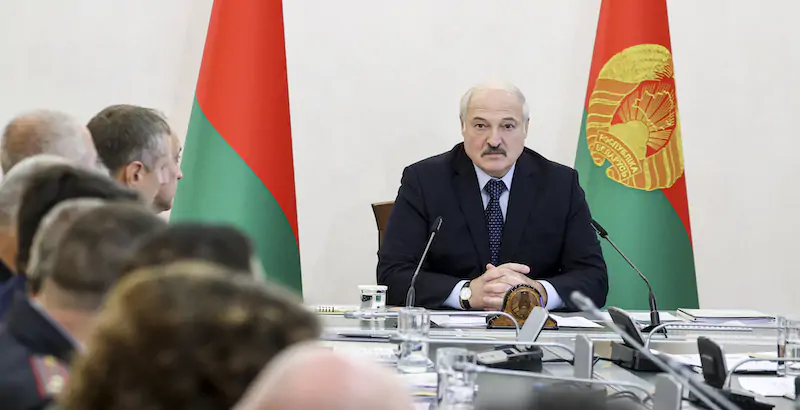Monday, exactly one year from last disputed elections presidential elections in Belarus, the United States, the United Kingdom and Canada have approved new sanctions against the regime of President Alexander Lukashenko, who has ruled the country in an authoritarian manner since 1994. The sanctions were not the first imposed on Belarus: during the last year different states and organizations, including the European Union, had already taken measures against the Lukashenko regime, accused of having initiated a ferocious repression against its opponents, those who had questioned the legitimacy of its electoral victory.
Compared to that August 2020, the power structure in Belarus has not changed – Lukashenko is still the president, supported by Russia – but several things have changed in the opposition, deeply weakened by arrests and forced exiles.
Svetlana Tikhanovskaya, Lukashenko’s main rival in the elections on 9 August, is today in forced exile, as is Veronika Tsepkalo, his ally; Maria Kolesnikova, the third female politician who along with Tikhanovskaya and Tsepkalo had challenged the president, is on trial in Belarus and faces up to 12 years in prison.
Meanwhile, Belarusian security forces arrested thousands of protesters and beat hundreds of them, they closed one of the most important independent news sites in the country, they diverted a Ryanair plane to arrest a dissident e they tried to forcibly bring home an athlete who had publicly challenged his coaches during the Tokyo Olympics. Ukrainian authorities are also investigating the death of Belarusian opponent Vitaly Shishov, who was found hanged near his home in Kiev in early August, and for whom a murder disguised as suicide is suspected.
Belarusian opponent Sviatlana Tsikhanouskaya, right, and Lithuanian Prime Minister Ingrida Simonyte in Vilnius, Lithuania (AP Photo / Mindaugas Kulbis)
–
Outside of national borders, the Lukashenko regime has adopted similarly aggressive policies. The countries that most directly suffered the consequences of the events of the last year were Lithuania, Latvia and Poland, which border on Belarus.
The first was Lithuania, as has become increasingly evident in recent weeks. The Belarusian regime has in fact “created” a new route of migrants to Europe with the aim of putting the Lithuanian government in difficulty – that is, one of the smallest and least equipped European countries to welcome migrants and asylum seekers – and by extension the entire European Union. Lithuania has been hosting some important figures of the Belarusian opposition for some time and the Ryanair flight that Belarus had hijacked at the end of May to arrest the opponent Roman Protesevich was headed to Lithuania. In retaliation, the Lukashenko regime had flown hundreds of people from Turkey and Iraq, promising them that they would not be stopped at the border between the two countries.
According to some estimates cited among others from Financial Times, in recent months, more than 4 thousand migrants have crossed the border.
Belarusian citizens in a demonstration against Lukashenko in Vilnius, Lithuania on August 9, 2021 (AP Photo / Mindaugas Kulbis)
–
Recently, the issue has also started to affect Latvia and Poland. In fact, under pressure from the European Union, Iraq has decided to suspend flights to Minsk, the Belarusian capital, and Lithuania has tightened border controls, significantly reducing entry. In response, the Lukashenko regime has begun to direct asylum seekers from Iraq, Syria and African countries to Latvia and Poland. Latvian Interior Minister Marija Golubeva said her government was ready to declare a state of emergency, while Foreign Minister Edgars Rinkevics said he was concerned about any incidents between NATO troops and Russian soldiers. and Belarus, which will take part in joint military exercises next month.
Despite the major demonstrations in recent months, which have however lost their intensity with government repression, and despite external pressure, Lukashenko’s regime seems more solid now than it was just after the elections, when Russia’s support he had faltered.
All opposition leaders have been arrested or forced into exile, and most media and NGOs, including educational institutions and human rights organizations, have been shut down and accused of acting on behalf of foreign countries. Tikhanovskaya, the opponent who is in forced exile, he said to Politico to still harbor hope for change, citing in particular the creation in the last year of various groups of professionals born with the aim of supporting the victims of government repression. For the moment, however, the conditions for regime change do not seem to exist, not even under the pressure of international sanctions.
–


